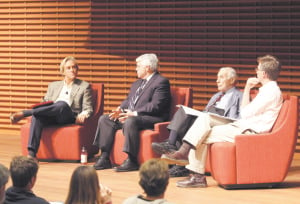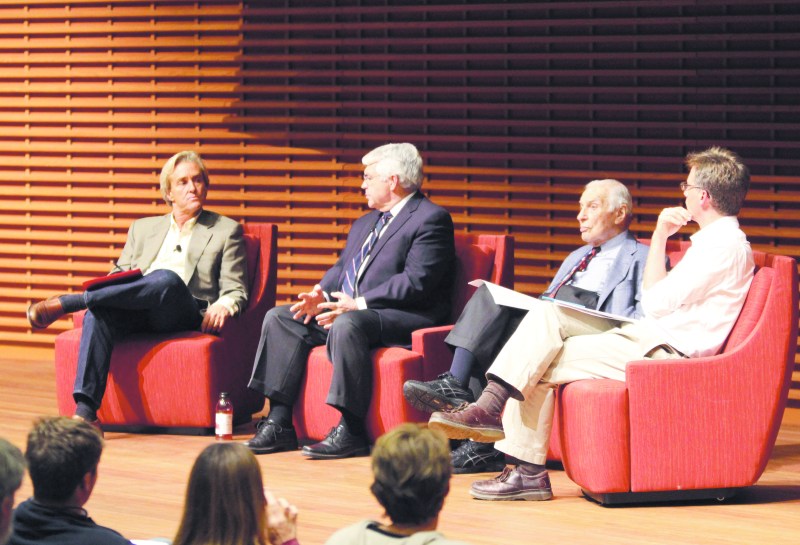
The discussion was held as a part of this week’s PoliSci 51K: Elections 2012 lecture. The class is a seminar series being held in the run-up to the 2012 elections and is comprised of 400 Stanford students and 200 attendees from Stanford Continuing Studies, as well as an online audience through iTunes U. The discussion almost filled Cemex Auditorium, the largest classroom on campus.
The two economists engaged in a freewheeling and disjointed conversation about a host of issues, ranging from budgetary concerns to assessments of American health care. The discussion was moderated by Jim Styer ’78, J.D. ’83 and Rob Reich, associate professor of political science.
An advisor to numerous Republican presidential administrations and campaigns, Taylor spoke first in an event Reich emphasized was “not organized as a debate but a dialogue about the economy.”
Comparing the federal government’s attitude towards change to the intransigence of the stubborn parent-teacher association at his child’s school, he asserted that the best route to economic wellbeing was to remove the incumbent administration and start anew.
“Our problems are based on policy,” he argued, going on to argue for “policies away from short-termism and towards sustainable growth, addressing education and the debt.”
“We should be concerned with long-term issues,” Arrow countered, pointing to the difficulties of promoting proposals with longer time horizons during an election season “But the tendency of any electoral system is to be comfortable with short-term issues.”
He went on to discuss the disadvantages of what Obama opponents see as key fixes, namely, reductions in government spending.
“Spending cuts are not productive,” he argued. “The real problem is the underutilization of resources. We can’t cut down what is really an investment in the future.”
After the opening remarks, the discussion veered to issues brought up in last week’s presidential debates. Taylor was reticent to comment on specific issues, such as the particular tax loopholes that would be closed under a Romney administration, a contentious matter in last week’s debate. According to the Washington Post, Taylor is a frontrunner to be chairman of the Federal Reserve under a potential Romney presidency.
Arrow then began a discussion of the need for government spending at a time when interest rates bottom out, as they did after the 2008 financial crisis.
“The problem with monetary policy is that when the interest rate gets to zero, you hit a limit. That’s what happened in the Great Depression, and I’m probably the only one in the room who remembers that time,” joked the 91-year-old Arrow.
Taylor argued in response that “temporary spending, such as the stimulus program, peter out very quickly and do not give you sustainable growth.”
Debating health care for the elderly, the two held contrasting views, Taylor being sympathetic to the idea of a voucher system for Medicare, and Arrow opposed.
“Medicare vouchers scare me very much, as doctors are already refusing Medicare patients,” Arrow said. “If you start really trying to control Medicare in the way [VP Candidate Paul] Ryan wants to, or in any way that the consumer is the allocator, it’s like depositors managing bank’s security.”
The ideological differences between Taylor and Arrow were bridged only when discussing the importance of enhancing the American educational system. Yet, when pressed for details, few were offered.
In essence, the two agreed on the fact that there were a number of challenges on the horizon for the US, but could hardly find a middle ground on which to base their solutions. However, Professor Taylor commented that it was essential not to let these divergences preclude progress from being made in these areas and foster partisanship and antipathy towards the other side.
“Partisanship occurs when you don’t like the other guy’s idea just because it’s from the other guy and that’s what we have to get away from,” he said.
The reaction from students to the discussion was mixed, with some complaining that the discussion was structured in too loose a manner to allow for clear articulations of differing points of view. Commenting on the discussion, Maxine Litre ’15 expressed frustration.
“A lot of Taylor’s answers seemed evasive, and in the context of an academic setting it would have been nice for him to have been a little more direct in his answers.”
